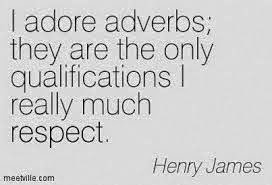Adverbs and the Law
In today's Wall Street Journal, Jacob Gershman (lead writer of its Law Blog) wrote an article about various views, including those held by Supreme Court and Appellate Court Judges, as to the use of adverbs in the law. He noted that their use suffers much "adversity."
Use of Adverbs in the LawJacob Gersham wrote that the use of adverbs "not only flourishes but wields power" in the American legal system. He asserts that they of late have taken on an "increasingly important - and often contentious role in courthouses" helped by the fact that lawmakers fill new law with them. Mr. Gersham references the following adverbs that presented issues to the court:
- "Knowingly Aim" - the 8th Circuit was presented with the question as to the meaning of the phrase containing the adverb knowingly. ["knowingly aimed a laser pointer at an aircraft"] U.S. v. Smith, 756 F.3d 1070 (2014). The issue presented was whether "knowingly" modifies both "aim" and "aircraft."
- "Substantially Burden" - the U.S. Supreme Court was presented with the the meaning of the phrase "substantially burden[ing] a person's exercise of religion" Burwell v. Hobby Lobby Stores, 134 S.Ct. 2571 (2014)
- "Designed Quickly" - that is whether the taxpayer quickly designed to place property beyond the reach of the government in order to justify a federal tax jeopardy assessment. Fumo v. US, 2014 WL 2547797 (E.D. Pennsylvania 2014)
Views CitedJacob Gerham notes various views as to the use of verbs, including the following:
- "superfluous generally" - legal anthropology professor
- "use has surged since the 1980s ... especially in the criminalization of white-collar and regulatory offenses" - Professor Lawrence Solan
- "legislators and adverbs need each other ...[s]tatutes have to be hyper-literal and generic" - Bryan Garner (editor of Black's Law Dictionary)
- "tempting to use an adverb ...it says exactly what you mean" - Judge Gregory K. Orme
- "Makes it more likely a lawyer will lose an appeal" - 2008 study by law scholars
- "Works in your favor" - if judge likes their use
- "I do not like adverbs...their use is a cop-out" - Justice Anthony Kennedy
- "The road to hell is paved with adverbs" - Stephen King ("One Writing - A Memoir of the Craft")
Adverbs The dictionary defines "adverbs" as words used to "modify the sense of a verb, participle, adjective, or other verb." Examples are: as to a verb - he drove slowly (how did he drive?), as to an adjective - he drove a very fast car (how fast was his car?), as to another adverb - she moved quite slowly down the aisle (how slowly did she move?) Adverbs often
- tell when, where, why, or under what conditions something happens
- frequently end in -ly, but many words ending in -ly are adjectives
- have two forms, one ending in -ly and one that does not (late and lately)
Three Functions: More, Less or Describe"Adverbs often functions as intensifiers, conveying a greater or lesser emphasis to something" and serve three different functions:
- to emphasize (I really don't, She simply ignored me)
- to amplify (I so wanted, I know this city well)
- to down tone (The employee almost quit, He sorta felt betray)
Jordan E. Bublick - Miami Bankruptcy Lawyer - Kendall & Aventura Offices - (305) 891-4055 - www.bublicklaw.com

.jpg)
 Updated daily, this blog will keep you informed on the latest bankruptcy news!
Updated daily, this blog will keep you informed on the latest bankruptcy news!  Learn more about how Bankruptcy works and what you need to know.
Learn more about how Bankruptcy works and what you need to know.